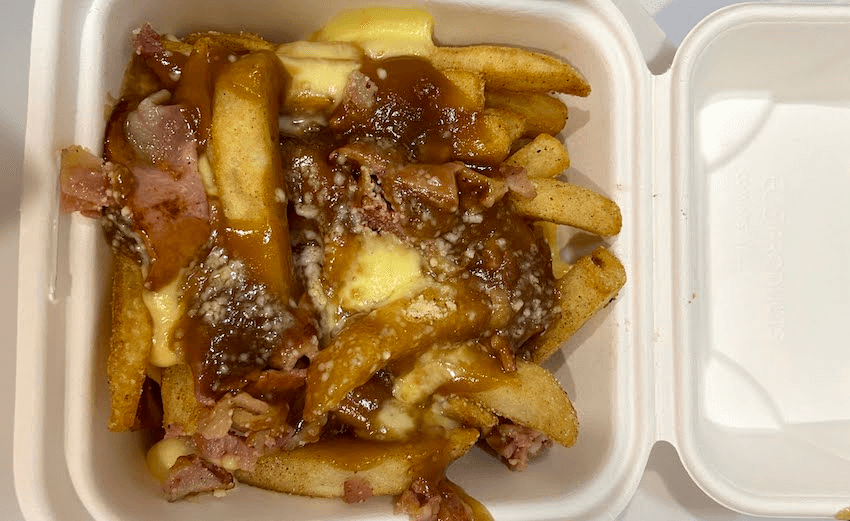From Burger Fuel’s ‘Vladimir Poutine’ to the Fed Deli’s ‘Montreal’ offering, NZ’s efforts are missing one crucial element, writes token Canadian and poutine correspondent Justin Giovannetti.
Expectations were low when I was handed a take-away container of poutine from Burger Fuel. For starters, the ingredients were very wrong. Amplifying my concern, the concoction was thrown together in a few seconds by rushed staff.
Poutine should never be an afterthought. Appearing simple with only three ingredients mixed together, at least in the traditional recipe, the gooey jumble is a surprisingly difficult dish to make really well. There’s lots of bad poutine out there.
It comes as a surprise to most French Canadians that poutine exists anywhere beyond the borders of Québec. Poutine is part of the province’s traditional cuisine. It’s a rural dish, born of poverty, a bit of desperation and, anecdotally, people looking for a midnight snack in the middle of a bender.
It comes as a shock then that New Zealand, about as far from Québec’s farming hinterland as locals can imagine, has a surprisingly rich selection of poutine. Not just as a transplanted curiosity at some specialty restaurants, but as a recurring item on the menu at one of the country’s biggest burger chains.
Poutine is made of fries, gravy and cheese curds mixed together. Each of the ingredients comes together, but also stays apart in a good poutine. It should be a balancing act, not a mess.
At an authentic roadside joint in Québec with truly excellent poutine, the fries are made fresh from potatoes and never frozen. That ensures they won’t get soggy when the gravy hits them. Poutine sauce, which is what it’s called in French, isn’t a thick gravy. It’s neither too sweet nor salty, while being neither too thick nor runny.
The most indispensable ingredient in poutine is cheese curds. Curds are moist, barely processed cheese with a mild taste. They squeak between your teeth when you bite into them. Because of their moisture, they don’t melt when gravy is poured onto them.
The cheese in a poutine is not supposed to melt and get stringy. That’s a no-no.
Cheese curds are popular in rural Québec, where they are made locally and fresh every morning. They only last 24 hours before losing the squeak that makes them distinctive. In big cities like Montreal, curds are harder to get. Poutine is not a big city dish.
In most of Canada outside Québec, curds are damn near impossible to find. I’ve yet to find any in New Zealand, although I’m promised about once a month that some shop somewhere over the next hill has them. One day I’ll walk into a shop in Otago and find them.
The poutine that’s often held up as New Zealand’s best is at Al Brown’s Federal Delicatessen in downtown Auckland. It’s a good poutine to people who have never had good poutine. The fries are yummy. The sauce is a little too sweet, but otherwise fine. The cheese, however, tastes and looks like mozzarella cut into cubes. They melt in the sauce and add zero squeak. Those aren’t cheese curds.
The Fed’s creation also loses points for being called a “Montreal poutine.” The dish illustrates in vivid colour that a lack of fresh cheese curds is really holding back New Zealand’s poutine dreams.
Where Al Brown has tried to recreate poutine far from its home, Burger Fuel has not. The chain’s Vladimir Poutine has bacon, grated parmesan, thick gravy and nondescript cheese advertised as curds. Unlike some online reports, the takeaway I got pretty much reflected the ad over the cash register. The Lower Hutt location was serving up a melted nondescript bland cheese. Et tu, Colby?
The verdict: Burger Fuel’s poutine works, mostly because there’s nothing traditional about it.
It’s tasty and hits the spot. They should drop the pretence of cheese curds and just go with the fact that it’s a fun mix of things. They’ve already named it after the Russian president—whose name really is spelled Poutine in French. That has nothing to do with French Canada. This isn’t a Québec poutine and it isn’t really trying to be one. It’s a Kiwi blend.
As poutine becomes increasingly international, there’s a school of thought that it could become a more generic term for a mixture with fries and cheese. In the same way that a traditional pizza in Naples and a deep dish in Chicago share the same name and lineage, but are vastly different things.
New Zealand would be an infinitely better place if it fell in love with cheese curds. Until it does, I’ll keep searching for good traditional poutine in Aotearoa. Keep making poutines and rolling out Montreal-style bagels, New Zealand. Oh, and if we’re going to take all of Québec’s tasty things, can we adopt pouding chômeur as well?
Justin Giovannetti is currently writing a book on poutine and would like to reassure his patient publisher that it’ll soon be done.
Hear Justin talk poutine on this episode of The Spinoff’s food podcast Dietary Requirements. Listen on Apple Podcasts, Spotify or your favourite podcast provider.





